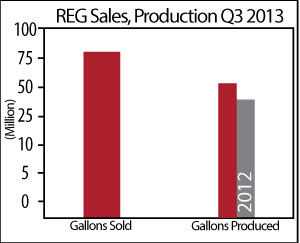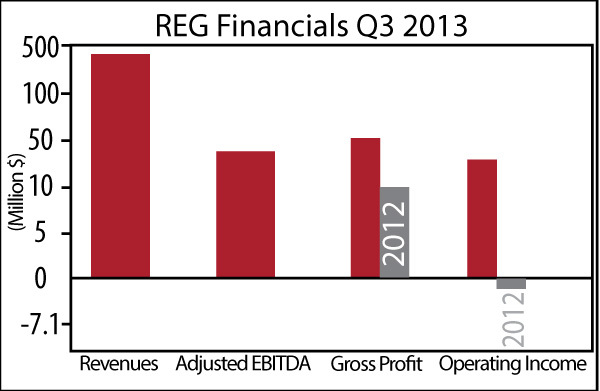Busy, profitable time for largest US biodiesel producer



December 31, 2013
BY Ron Kotrba
The end of 2013 brought a flurry of activity from the largest U.S. biodiesel producer, Renewable Energy Group Inc., with a major acquisition announcement, distribution and logistical expansions, facility openings and technology upgrades.
In late December, REG announced it would acquire Syntroleum Corp., including its 101 issued or pending patents, renewable diesel technology (Bio-Synfining) and 50 percent stake in the Dynamic Fuels LLC joint venture with Tyson Foods, including the 75 MMgy renewable diesel facility in Geismar, La.
In late November, REG entered into an agreement with Dutch Hill Terminals, a leading heating oil terminal in New Jersey, to market biodiesel and biodiesel-blended heating oil at its Clifton, N.J., location. “This terminal position will give us additional capacity to serve the existing markets in the Northeast and prepare for potential growth moving into 2014,” says Gary Haer, REG vice president, sales and marketing. “As the region increases its consumption of biodiesel in transportation fuel and Bioheat, REG will continue to provide a reliable source of high-quality, clean-burning, advanced biofuel.” REG has five other terminal locations in the Northeast, including Whippany and Bayonne, N.J., and New York locations in New Hyde Park, Port Chester, Ontario and Brookhaven.
Advertisement
In mid-November, REG formally opened its new barge loading facility at its Seneca, Ill., biodiesel plant and celebrated the accomplishment with a ribbon-cutting ceremony. State and local officials and business leaders joined REG leadership to mark the occasion, as well as witness the first barge shipment of 420,000 gallons of biodiesel from the multifeedstock, 60 MMgy plant located by the Illinois River. The barge loading facility will be supported by the addition of 2.5 million gallons of new terminal storage. REG’s total investment in these upgrades is about $4.5 million.
“The barge berth at REG Seneca further enhances our lower-cost, efficient business model,” says Daniel J. Oh, president and CEO of REG. “Adding more barge capabilities to our network of biorefineries and terminals across the country gives REG another capability for providing high-quality biodiesel to our existing and future customers.” Biodiesel is also shipped from Seneca by truck and rail. REG has barge and deepwater ship loading capabilities at its Houston, Texas, biorefinery and its New York Harbor terminal location at the IMTT facility in Bayonne, N.J.
“Every full barge that leaves Seneca equates to about 65 truckloads of biodiesel,” says Brad Albin, REG vice president, manufacturing. “This not only increases efficiencies, but expands the geography and customer base we can cover through the inland waterways system.”
Advertisement
Robert Flider, director of the Illinois Department of Agriculture, speaks of how biodiesel personifies the partnership between agriculture and renewable energy. “Illinois farmers benefit from additional markets,” he says. “The Illinois economy benefits from the jobs this industry provides and supports, and our country benefits from additional energy security that a domestic renewable energy source like biodiesel brings.”
In late October, REG held a ribbon-cutting ceremony to open its recently acquired biodiesel refinery in Mason City, Iowa, formerly Soy Energy LLC, and announced it has begun a $20 million project to upgrade the plant to a multifeedstock facility. “With these upgrades, we will be able to utilize lower-cost raw materials like inedible corn oil from ethanol production, used cooking oil and animal fats, with the majority coming from a close proximity to Mason City,” Albin says.
A multifeedstock upgrade was also recently completed at REG’s Albert Lea, Minn., facility.
“These moves show the strength of REG’s commitment to remaining a leader in the biodiesel industry and our ability to remain well-positioned to succeed in an evolving biodiesel marketplace,” Oh says.
Upcoming Events





